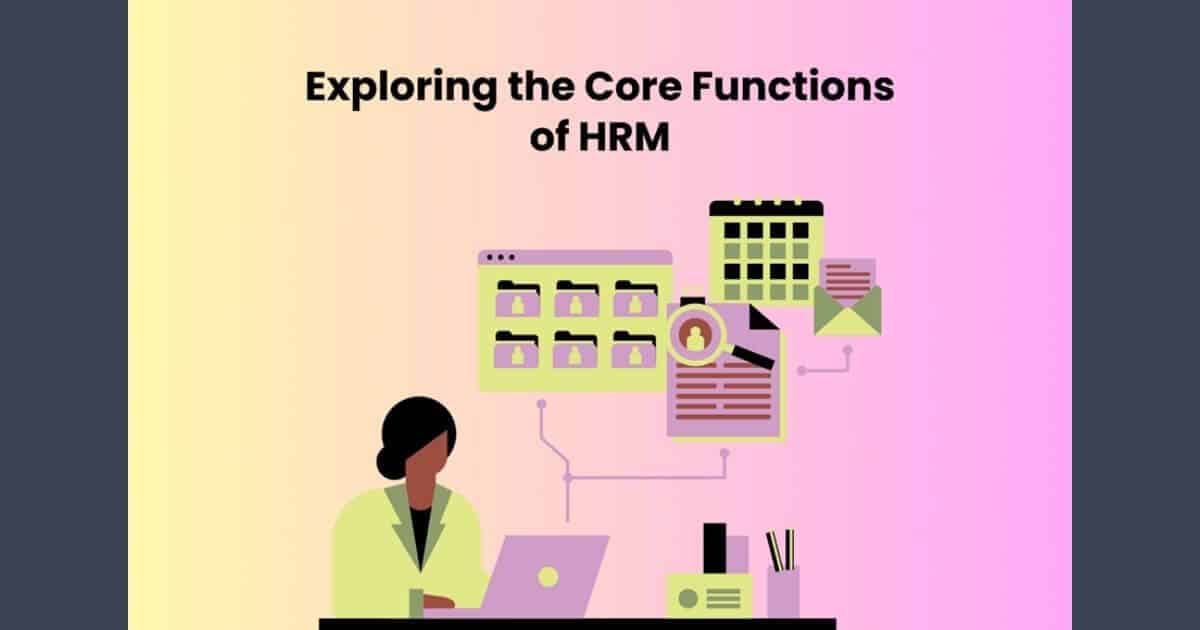In a workplace, the significance of Human Resource Management (HRM) cannot overstate. At the nucleus of any successful organization lies an efficient HR department, steering the ship by managing its most invaluable asset—its people. To comprehend the essence of HRM, it is crucial to delve into its core functions, understanding the intricate mechanisms that drive organizational success. In this blog, we will look at the core Functions of Human Resource Management.
Before delving deeper into the functions of HRM, let’s acknowledge the importance of Human Resources Qualifications. HR professionals function as the linchpin between an organization and its workforce, necessitating a diverse skill set and comprehensive knowledge. Human resources qualifications encompass a broad spectrum, including expertise in labor laws, conflict resolution, strategic planning, talent acquisition, performance management, and more.
Now, let us talk about the functions of Human Resource Management, which are fundamental pillars supporting organizational growth and efficiency.
Talent Acquisition and Recruitment
Talent Acquisition and Recruitment in HRM core functions involves sourcing, attracting, and selecting top-quality candidates to meet organizational needs. HR professionals craft compelling job descriptions, employ diverse sourcing strategies, and conduct rigorous screening processes, including interviews and assessments.
They assess cultural fit and skill alignment, ensuring candidates resonate with the company’s values and goals. Leveraging employer branding and networking, HRM builds talent pipelines, attracting diverse and qualified candidates. Streamlining the recruitment process through technology and innovation, HRM secures the best talent, fostering a skilled workforce essential for driving organizational growth and maintaining a competitive edge in the market.
Training and Development
Training and Development in HRM involves cultivating employee skills and knowledge for enhanced performance and career growth. HR professionals design and implement diverse training programs, workshops, and e-learning modules tailored to individual and organizational needs.
They identify skill gaps, create personalized development plans, and evaluate training effectiveness through assessments. Continuous learning initiatives foster a culture of innovation, adaptability, and employee engagement.
Performance Management
Performance Management in HRM involves overseeing, evaluating, and enhancing employee productivity and contributions. HR professionals establish performance criteria, conduct regular reviews, and offer constructive feedback to optimize individual and team performance.
They set SMART (Specific, Measurable, Achievable, Relevant, Time-bound) goals, foster a culture of continuous improvement, and recognize achievements. Performance appraisals identify strengths, areas for development, and align employee efforts with organizational objectives.
Employee Relations and Conflict Resolution
HRM plays a pivotal role in maintaining healthy relationships between the organization and its employees. It manages conflicts, addresses grievances, and fosters a positive work environment conducive to productivity and employee satisfaction.
Compensation and Benefits
Compensation and Benefits within HRM encompass designing equitable pay structures, managing employee benefits, and ensuring competitive packages. HR professionals devise fair remuneration systems, considering market benchmarks and internal equity. They administer comprehensive benefit programs, including healthcare, retirement, and rewards, to attract and retain top talent.
Strategic analysis of compensation trends and employee preferences ensures the organization remains attractive in the job market while motivating and retaining a satisfied, productive workforce. Adjusting packages to align with industry standards and employee needs highlights HRM’s commitment to develop a rewarding work environment.
Strategic Planning
Strategic planning in HRM core functions involves forecasting workforce needs, implementing succession plans, managing organizational restructuring, fostering diversity and inclusion, and adapting to technological advancements.
It anticipates future talent requirements, cultivates internal leadership potential, navigates organizational changes, promotes inclusivity, integrates evolving technologies, and crafts global HR strategies.
Compliance and Legalities
Compliance and Legalities form a crucial facet of HRM, ensuring adherence to labor laws, regulations, and ethical standards. HR professionals meticulously navigate complex legal landscapes, interpreting and implementing employment laws, workplace safety regulations, and diversity requirements.
They establish policies, procedures, and training to mitigate legal risks, prevent discrimination, and uphold ethical conduct. Regular audits and updates ensure organizational practices align with evolving legal frameworks. By championing ethical practices and legal compliance, HRM safeguards the organization, fosters a fair work environment, and minimizes legal liabilities, underlining the pivotal role HR plays in preserving the organization’s reputation and credibility.
Conclusion
The functions of Human Resource Management form the bedrock of organizational success. From acquiring talent to fostering a conducive work environment and aligning strategies with company objectives, HRM encapsulates a myriad of responsibilities critical for sustaining and thriving in today’s competitive business landscape. The continuous evolution of HRM requires an initiative-taking approach, where HR professionals adapt, innovate, and lead the way in shaping the future of work.







